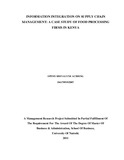| dc.description.abstract | According to Gavirneni 2002; Hult et al. 2004; Kulp et al. 2004; Lee 2004; Li 2002; Liu
et al. 2005; Soliman and Janz (2004), the central aim of information integration on supply
chain management is to ensure that organizations can reap significant returns to
investment, some which include decreased order cycle times, increased agility to respond
to customer demand, and increased firm profitability. A synergic supply system between
companies needs to be created so as to compress information time so that the information
circulating through the system is fresh and meaningful. Customers consistently demand
that products are delivered faster, on time, and with no damage. This can only be
achieved with proper coordination of efforts by linking systems and processes to create
synergy.
The main purpose of this study was to examine information integration on supply chain
management among food processing firms in Nairobi. The study adopted the exploratory
survey design to study the information integration on SCM in food processing firms in
Nairobi. The target population was all private food processing entities in Nairobi, who
are members of KAM. Using the stratified sampling method, 30 firms was picked to
constitute the sample. This represented 30 % of the sampling population. The primary
data collection instrument that was used to collect data was the questionnaire. Descriptive
statistics was used to analyze the data.
From the study findings, the researcher concludes that the current Information systems
among the food processing firms in Nairobi satisfy supply chain communications
requirements in the organization as there is smooth communication flow between the
customers and the firm thus leading to satisfaction of both. The food processing firms
have integrated information technology in order processing, dispatch, distribution,
purchasing, transport management, production and inventory control. This has reduced
time in servicing customer orders, increased financial performance of the organization,
increased customer service levels, increased timely deliveries. The study recommends
that to improve information integration on supply chain management, the management should make sure that all the respective heads of departments have full and clear
information on time to enhance easy decision making, using the latest model of software
and hardware available in the market, training of staff, adopt real time solutions in ICT
and increase external linkages with customers | en |

